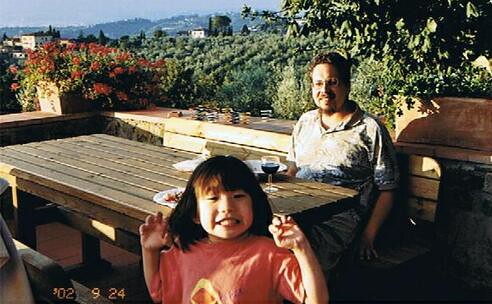Sunday, October 6th, 2013
(with thanks to Leilani for the lovely restatement of Machado's theme)
Wanderer, these your steps
make up the path, and nothing more;
wanderer, there is no path:
you make the path by walking.
By walking you make the path,
and turning back your gaze you see
the trail you'll tread upon no more.
Wanderer, there is no path:
just wake upon the sea.
— Antonio Machado: Proverbs and poems â…©â…©â…¨
I've had this poem on my mind quite a bit recently. I thought I would spend a little time writing about it — I'd like to examine its face-value meaning, the metaphor of the poem, and the value of the metaphor, how it speaks to me; and incidentally I'd like to put a little effort into defending my translation, which is fairly different from the standard translation of Betty Jean Craige, in Selected Poems of Antonio Machado, 1979. I think (obviously I think) it is an improvement on Craige's translation; it seems worthwhile to elaborate on why I think that way — how my translation speaks more clearly than Craige's. But that should be a secondary point really; what I really want to talk about is how it is that I find this poem to speak to me so clearly. It is nice as well to get a chance to quote a couple of poems that I've translated and written over the past few years. I think it will make worthwhile reading, see what you think.
Let's reread Machado's first lines. Your steps make up the path, and nothing more. (The "path" dang it, not the road — roads are engineered and built by crews of men over the years, not "made by walking". And a wanderer is hardly confined to the roadways.) A path is a most personal thing. And what Machado's metaphor here is, is the path of one's life: it's not mapped out before one but made up of one's footsteps, the trail one leaves through life. Which one will tread upon no more. The obvious question here to ask is, "But isn't that pretty obviously true?" and yes, of course it is, and has been pointed out before; but an obvious truth that seems perennially to need restatement — one that comes to me at least as a revelation every time I hear it expressed, and doubly so when it is expressed so elegantly as Machado puts it here.
I came to this poem pretty early in life. I can't remember what group it was but I seem to recall its having had an anthemic quality in some vaguely lefty/artistic circles I had some contact with in my teen years — possibly I remember it from Peace Camp, though in what context is not quite clear.* It has an elemental feel to it, something so clearly correct and valuable that it is hard to know where to begin. (And this quality is, obviously, so strong that it shines through a slight roughness of rendering like Craige's, which is the poem I remember from my youth. It was not until I was talking about it with a friend last year and he brought up the objection vis-a-vis roads that I realized a better translation was needed.) I heard it again recently in Oaxaca, a man played guitar and sang it prior to a poetry reading.
Machado's clarity of voice as he addresses you, asks you to reexamine the ground you're walking on, gives you the reader a new point of perspective. Likewise another restatement of this metaphor, this obvious truth — poems of a slightly different form but closely related theme are a few of Pablo Antonio Cuadras's about el maestro de Tarca. The first and eighth poems in his series both feature el maestro sitting up on la Piedra del Ãguila, telling his disciples what is fitting and just. The maestro's seafarer plays much the same role here as the wanderer (in the desert?) of Machado.
(â… )
Seated up on Eagle Rock
el maestro de Tarca told us:
It is fitting
it is just
that the seafarer
should grasp
all things by their name.
In times of danger
the things without names
are the ones that harm.
(â…§)
Seated up on Eagle Rock
el maestro de Tarca told us:
It is fitting
it is just
that the seafarer
should leave to the waters
his adventure.
Wake formed
time lived
Wake dissolved
time erased.
One thing I love about Machado's treatment of this universal truth is how easily it can be parodied, and how the parodies can ring clear, can bring out new shades of meaning in the original. What at first seems paradoxical can with a slight twist of the lenses be made to appear blindingly, obviously the case. Take for instance Leilani Hagberg's line in the title of this piece, or my expansion on it:
Cuentista, son tus palabras
la idioma y nada más;
cuentista, no hay idioma,
se hace idioma al hablar.
Al hablar se hace la idioma,
y al recordar las sÃlabas habladas
se oye el relato que nunca
se ha de volver a narrar.
Cuentista no hay idioma
sino espuma sobre las aguas. | Storyteller, it's your words
that make up language, nothing more.
Storyteller, there's no language;
by speaking you create the language.
Language is built by speaking,
and the memory of syllables uttered
is the sound of a story
You'll never get to tell again.
Storyteller, there's no language,
just foam upon the waters. |
For language (while it is of course a facility created over hundreds (or tens?) of thousands of years by all of humanity in concert) has as highly personal a quality to it when considered in the particular case as does one's path. A sillier (and a fun, and rewarding, to be sure) parody, and one that indeed suffers from the same symptom of misunderstanding as does Craige's version, is:
Jugador, son tus apuestas
el casino y nada más;
Jugador, no hay casino,
se hace casino al apostar.
Al apostar se hace el casino,
y al lanzar las fichas en el fieltro
se oye el dinero que nunca
se va a poder recuperar.
Jugador no hay casino
sino monedas en la mar. | Gambler, it's your wagers
that make the casino, nothing more;
gambler, there's no casino:
we make the casino by gambling.
By gambling we make the casino,
and tossing down your tokens on the felt
you hear money that you'll never
get to pick back up.
Gambler, there's no casino,
just coins dropped into the sea. |
Let's look at another fragment of Machado's concerned with paths and wanderers; this one from "I keep dreaming of pathways":
I keep dreaming of pathways
evening's pathways —The hills,
the golden hills, the green green pines,
dusty holm oak trees!...
And where does this pathway lead?
I keep singing, oh wanderer,
you at the end of the pathway...
–now evening is falling–.
And let's let evening fall.
Not quite sure how to bring out what it is that I find so compelling about the central metaphor these pieces all have in common, why it rings so clear to me and (I hope) to the reader. (—Not to take any unwanted liberties.)
 * Also Ellen reminds me to mention Myles Horton and Paolo Freire's book We Make the Road by Walking: Conversations on Education and Social Change (1990).
posted morning of October 6th, 2013: 3 responses
➳ More posts about Poets of Nicaragua
|


















